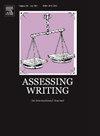Feedback literacy in writing research and teaching: Advancing L2 WCF research agendas
Abstract
Research on corrective feedback (CF) has developed from its original focus on identifying which type of CF is most effective for developing L2 language learners’ grammatical accuracy to focusing on how learners use CF. Underpinning this is the assumption that learners know what to do with CF when they receive it. The concept of “feedback literacy” challenges this assumption. Carless and Boud (2018), define feedback literacy as “the understandings, capacities and dispositions needed to make sense of information and use it to enhance work or learning strategies” (p. 1316). Our intention in this paper is to reflect on the manner in which theoretical and empirical work on feedback literacy can contribute to advancing L2 written corrective feedback (WCF) research agendas. Central in our proposal is the partially under-researched aspect of experience in terms of the L2 writers’ educational background experience, particularly experience with L1 and L2 writing. We further argue that how learners were taught L1 writing and how the L1 educational culture/ society values writing can impact on how learners approach L2 writing tasks and accompanying feedback. Implications of this inclusive view of the learner for future research and pedagogy is discussed.

 求助内容:
求助内容: 应助结果提醒方式:
应助结果提醒方式:


